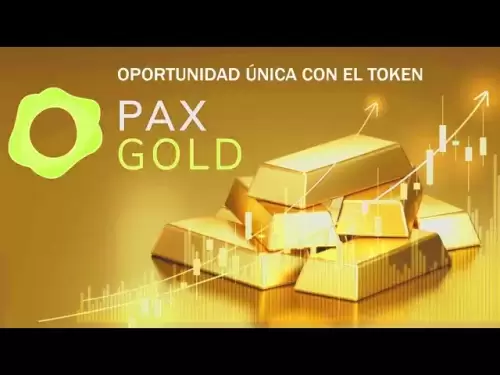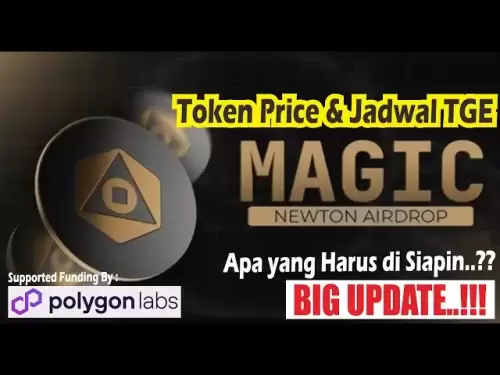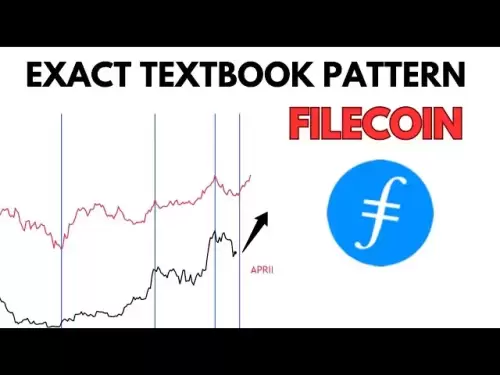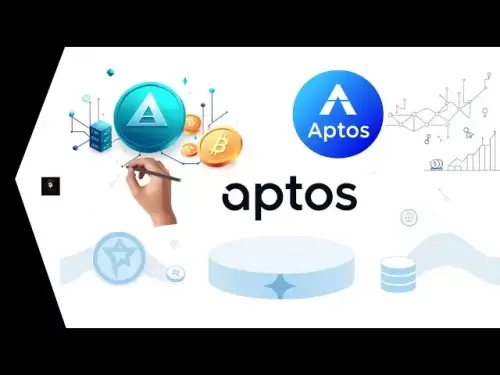-
 Bitcoin
Bitcoin $99,594.2189
-3.59% -
 Ethereum
Ethereum $2,188.5793
-9.00% -
 Tether USDt
Tether USDt $1.0001
-0.02% -
 XRP
XRP $1.9745
-5.82% -
 BNB
BNB $608.9511
-3.73% -
 Solana
Solana $130.4575
-5.93% -
 USDC
USDC $1.0000
0.01% -
 TRON
TRON $0.2637
-3.59% -
 Dogecoin
Dogecoin $0.1493
-5.97% -
 Cardano
Cardano $0.5322
-6.72% -
 Hyperliquid
Hyperliquid $33.9044
3.33% -
 Bitcoin Cash
Bitcoin Cash $449.6411
-5.46% -
 UNUS SED LEO
UNUS SED LEO $8.9629
0.43% -
 Sui
Sui $2.3943
-8.35% -
 Chainlink
Chainlink $11.4402
-7.83% -
 Stellar
Stellar $0.2241
-6.49% -
 Avalanche
Avalanche $16.1489
-4.24% -
 Toncoin
Toncoin $2.7182
-5.94% -
 Shiba Inu
Shiba Inu $0.0...01040
-5.72% -
 Litecoin
Litecoin $78.7882
-4.07% -
 Ethena USDe
Ethena USDe $1.0004
-0.01% -
 Hedera
Hedera $0.1305
-7.45% -
 Monero
Monero $297.0030
-5.32% -
 Dai
Dai $0.9997
-0.02% -
 Polkadot
Polkadot $3.1834
-6.03% -
 Bitget Token
Bitget Token $3.9788
-7.03% -
 Uniswap
Uniswap $6.1327
-10.62% -
 Pepe
Pepe $0.0...08689
-8.30% -
 Pi
Pi $0.4826
-9.65% -
 Aave
Aave $219.8043
-9.69%
how.to.buy crypto.without platform
For optimal security, store your cryptocurrency in a secure offline wallet that is not accessible online.
Jan 29, 2025 at 06:48 pm
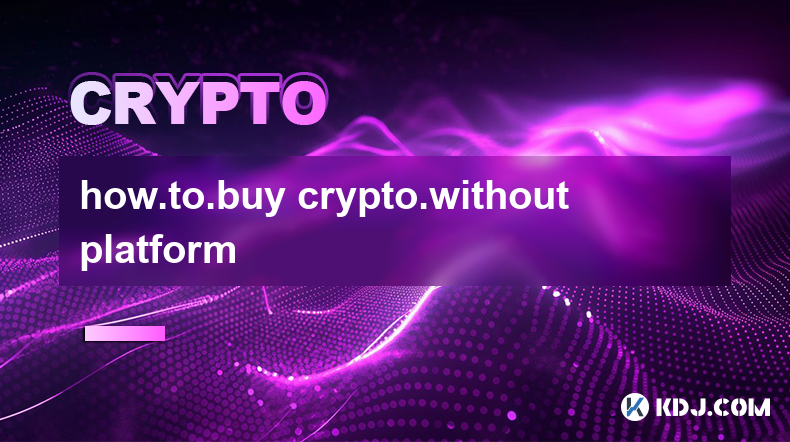
Key Points:
- Choose a reliable over-the-counter (OTC) marketplace or broker-dealer.
- Consider peer-to-peer (P2P) exchanges for direct transactions with individuals.
- Utilize cryptocurrency ATMs for physical cash-to-crypto conversions.
- Access decentralized exchanges (DEX) for trading without intermediaries.
- Explore hybrid exchanges that combine centralized and decentralized features.
Detailed Guide:
1. Over-the-Counter (OTC) Marketplaces and Broker-Dealers:
- OTC marketplaces connect buyers and sellers directly without using an exchange.
- Broker-dealers act as intermediaries, facilitating transactions for clients.
- These platforms often offer higher limits and lower trading fees than exchanges.
- Due diligence is crucial to ensure the platform's reputation and security.
2. Peer-to-Peer (P2P) Exchanges:
- P2P exchanges enable direct crypto transactions between individuals.
- Users create trade offers with their desired terms and rates.
- Security protocols vary among P2P platforms, so research escrow services and reputation systems.
- Transactions require trust and communication between parties.
3. Cryptocurrency ATMs:
- Cryptocurrency ATMs allow users to buy crypto directly with cash.
- ATMs offer varying fees and cryptocurrencies depending on the provider.
- Some ATMs may require identity verification for larger purchases.
- Location and convenience may be a factor when choosing a crypto ATM.
4. Decentralized Exchanges (DEX):
- DEXs operate on blockchain technology without centralized intermediaries.
- Users retain control over their private keys and assets.
- Trading is conducted directly between wallets using smart contracts.
- Liquidity may be lower on DEXs than on centralized exchanges.
5. Hybrid Exchanges:
- Hybrid exchanges combine features of centralized and decentralized exchanges.
- They offer a curated selection of assets and higher liquidity than DEXs.
- Custodial wallets are typically used, which means the exchange holds the user's funds.
6. Additional Tips:
- Research and compare different platforms to find the one that best suits your needs.
- Always use two-factor authentication (2FA) for improved account security.
- Store your crypto in a secure offline wallet to enhance protection against hacking.
- Set realistic expectations for transaction speed and fees, as they can vary depending on the chosen platform.
FAQs:
Q: What are the advantages of buying crypto without a platform?
- Increased privacy and anonymity.
- Reduced reliance on third-party custodians.
- Potential for lower fees and higher trading limits.
Q: What are the risks of buying crypto without a platform?
- Increased responsibility for security and transaction processing.
- Potential for scams and fraudulent activity.
- Limited availability of certain cryptocurrencies.
Q: How can I prevent scams when buying crypto without a platform?
- Verify the identity of counterparties and research the platform's reputation.
- Use secure communication channels and avoid sharing sensitive information.
- Consider escrow services or reputation systems for P2P transactions.
Disclaimer:info@kdj.com
The information provided is not trading advice. kdj.com does not assume any responsibility for any investments made based on the information provided in this article. Cryptocurrencies are highly volatile and it is highly recommended that you invest with caution after thorough research!
If you believe that the content used on this website infringes your copyright, please contact us immediately (info@kdj.com) and we will delete it promptly.
- PEPE Token's Stumble & Pepeto's Gains: A Frog-Fueled Crypto Face-Off
- 2025-06-23 04:25:12
- Bitcoin Crash and Reaction: Navigating Geopolitical Tensions and Market Volatility
- 2025-06-23 04:25:12
- Bitcoin Bears in the Critical Zone: Navigating the $100K Battleground
- 2025-06-23 04:45:12
- TikTok, Trump Coin, and Bribery Accusations: What's the Deal?
- 2025-06-23 04:45:12
- Web3 AI Sizzles as It Crosses $8.3M Amidst Market Indecision
- 2025-06-23 04:50:12
- Tokocrypto Takes Bogor: Crypto Trading and Web3 Innovation Meetup
- 2025-06-23 05:05:12
Related knowledge

What is Ethereum’s Slashing mechanism and how to punish malicious behavior?
Feb 20,2025 at 03:08am
Key PointsOverview of slashingDifferent types of slashing in EthereumIncentives and consequences of slashingIdentifying and reporting slashed validatorsOngoing discussions and potential improvementsEthereum's Slashing Mechanism: Punishing Malicious BehaviorEthereum's slashing mechanism is an essential tool for ensuring network security and punishing mal...

What is the verifier node of Ethereum and how to become a verifier?
Feb 19,2025 at 06:00pm
The Verifier Node of Ethereum: A Comprehensive GuideKey Points:What is a Verifier Node?How to Become a Verifier NodeResponsibilities and Rewards of a Verifier NodeMinimum Requirements for Becoming a Verifier NodePotential Difficulties in Running a Verifier Node1. What is a Verifier Node?A Verifier Node is an independent entity on the Ethereum network th...

What is Ethereum’s staking, and how to participate and earn money?
Feb 19,2025 at 04:37pm
Key Points:Understanding Ethereum's Staking MechanismSteps to Participate in StakingBenefits and Rewards of StakingSecurity and Risk ConsiderationsTechnical Requirements and Hardware OptionsPotential Challenges and Troubleshooting TipsFAQs on Ethereum StakingWhat is Ethereum's Staking?Proof-of-Stake (PoS) is a consensus mechanism used in blockchain netw...

What is Ethereum’s DAO (Decentralized Autonomous Organization) and how does it work?
Feb 20,2025 at 03:12am
Key PointsDefinition and Structure of a DAOGovernance and Decision-Making in DAOsBenefits and Use Cases of DAOsChallenges and Limitations of DAOsWhat is Ethereum's DAO (Decentralized Autonomous Organization) and How Does It Work?Definition and Structure of a DAOA Decentralized Autonomous Organization (DAO) is an innovative governance and management fram...

What is Ethereum's multi-signature wallet and how to improve security?
Feb 20,2025 at 02:18pm
Key Points:Understanding the Concept of a Multi-Signature WalletBenefits and Drawbacks of Multisig WalletsRequirements for Setting Up a Multisig WalletStep-by-Step Guide to Generating a Multisig WalletImplementing Strategies for Enhanced Security1. Understanding the Concept of a Multi-Signature WalletA multi-signature (multisig) wallet in the Ethereum e...

What is Ethereum's oracle and how to provide data for smart contracts?
Feb 21,2025 at 01:30am
Key Points:Understanding the concept of oracles in EthereumExploring different types of oraclesDetailed guide on how to provide data for smart contractsAddressing potential challenges and considerationsWhat is Ethereum's Oracle?Oracles are crucial components in the Ethereum ecosystem, enabling smart contracts to access real-world data and off-chain even...

What is Ethereum’s Slashing mechanism and how to punish malicious behavior?
Feb 20,2025 at 03:08am
Key PointsOverview of slashingDifferent types of slashing in EthereumIncentives and consequences of slashingIdentifying and reporting slashed validatorsOngoing discussions and potential improvementsEthereum's Slashing Mechanism: Punishing Malicious BehaviorEthereum's slashing mechanism is an essential tool for ensuring network security and punishing mal...

What is the verifier node of Ethereum and how to become a verifier?
Feb 19,2025 at 06:00pm
The Verifier Node of Ethereum: A Comprehensive GuideKey Points:What is a Verifier Node?How to Become a Verifier NodeResponsibilities and Rewards of a Verifier NodeMinimum Requirements for Becoming a Verifier NodePotential Difficulties in Running a Verifier Node1. What is a Verifier Node?A Verifier Node is an independent entity on the Ethereum network th...

What is Ethereum’s staking, and how to participate and earn money?
Feb 19,2025 at 04:37pm
Key Points:Understanding Ethereum's Staking MechanismSteps to Participate in StakingBenefits and Rewards of StakingSecurity and Risk ConsiderationsTechnical Requirements and Hardware OptionsPotential Challenges and Troubleshooting TipsFAQs on Ethereum StakingWhat is Ethereum's Staking?Proof-of-Stake (PoS) is a consensus mechanism used in blockchain netw...

What is Ethereum’s DAO (Decentralized Autonomous Organization) and how does it work?
Feb 20,2025 at 03:12am
Key PointsDefinition and Structure of a DAOGovernance and Decision-Making in DAOsBenefits and Use Cases of DAOsChallenges and Limitations of DAOsWhat is Ethereum's DAO (Decentralized Autonomous Organization) and How Does It Work?Definition and Structure of a DAOA Decentralized Autonomous Organization (DAO) is an innovative governance and management fram...

What is Ethereum's multi-signature wallet and how to improve security?
Feb 20,2025 at 02:18pm
Key Points:Understanding the Concept of a Multi-Signature WalletBenefits and Drawbacks of Multisig WalletsRequirements for Setting Up a Multisig WalletStep-by-Step Guide to Generating a Multisig WalletImplementing Strategies for Enhanced Security1. Understanding the Concept of a Multi-Signature WalletA multi-signature (multisig) wallet in the Ethereum e...

What is Ethereum's oracle and how to provide data for smart contracts?
Feb 21,2025 at 01:30am
Key Points:Understanding the concept of oracles in EthereumExploring different types of oraclesDetailed guide on how to provide data for smart contractsAddressing potential challenges and considerationsWhat is Ethereum's Oracle?Oracles are crucial components in the Ethereum ecosystem, enabling smart contracts to access real-world data and off-chain even...
See all articles





















